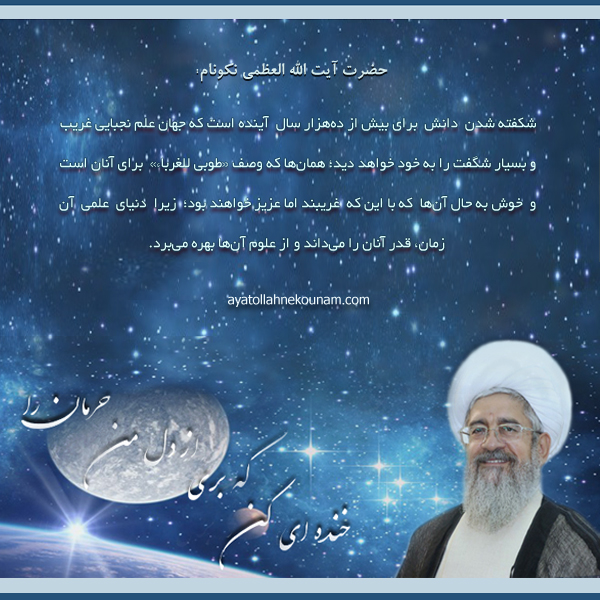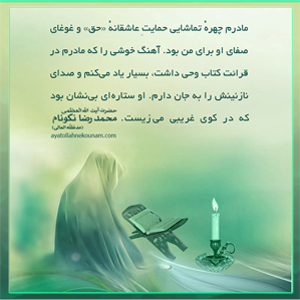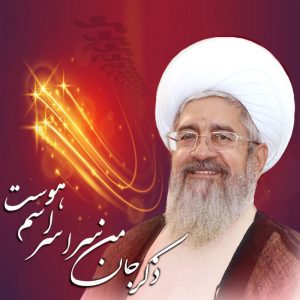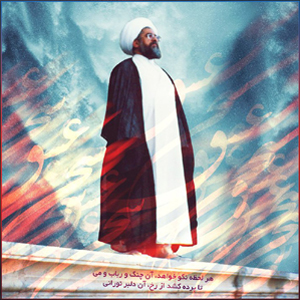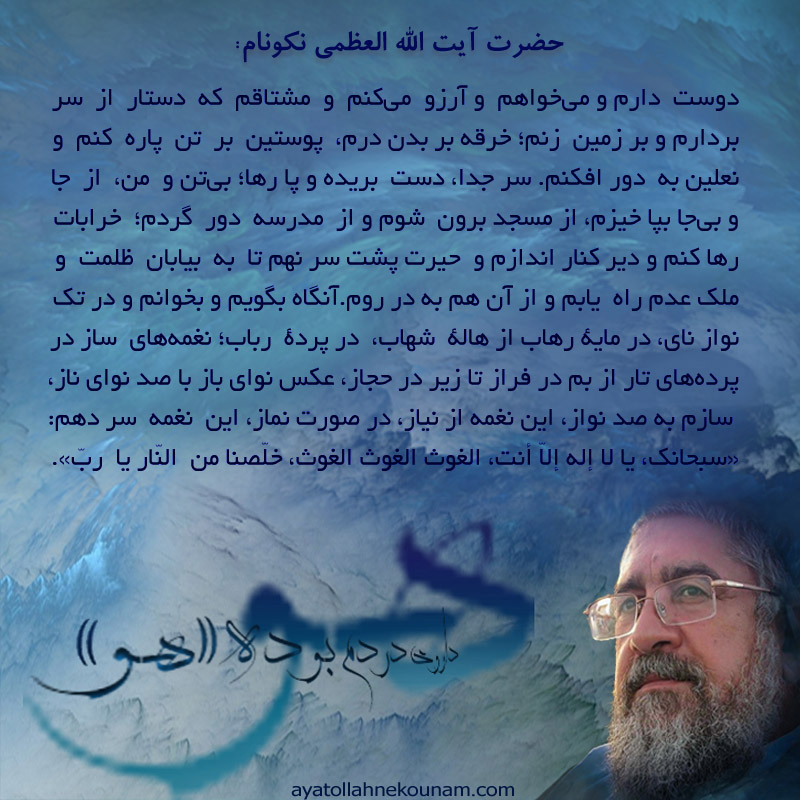Ayatollah Nekounam
Teachers
Less than 3 decades, I was interested in the instructors, but I viewed myself graduated from anyone at the age of 20. In the same period, many teachers helped me in various fields, each of whom has been tremendously amazing. I have benefited divine authorities and spiritual mentors such as Ayatollah ElahiQomshe’i, Ayatollah Sha’rani, Ayatollah Sheikh MortezaHa’eri, Ayatollah Seyyed Ahmad Khansari, Ayatollah Golpaygani and Ayatollah MirzaHashemAmoli (May God have mercy on them all).
Struggles
On June 5th 1962 when I was about 14 years old, I made Imam Khomeini’s acquaintance. He was like a father to us, and I loved him for his inner sincerity. Recruiting the revolutionary forces and doing the special tasks had been on me. I was in charge of selecting individuals for the special tasks and giving services for numerous necessary activities which could not be handled by ordinary individuals. At that time, I was in touch with Mr. Passandideh (Imam Khomeini’s brother) and told him what needed to be done. I trusted the late RabbaniShirazi and conducted special jobs like the supply of arms along with him. SAVAK (Shah’s Intelligence Service) had issued several arrests for me. Every time that I was wanted and under arrest, I was able to set myself free in my own way. One of those methods was to use the pretext of studies that was reasonably believable. Multiplicity of studies made my revolutionary activities go unnoticed by SAVAK. I used to sleep very little so much so that I was content with an hour or even half an hour during a day and a night.
Managerial experiences
For a short while, I was in charge of administering the affairs of Kish Island, Imam Khomeini Port, Mahshahr, Mashhad and Esfarayen. I used to administer Kish Island on my own where I appointed 40 officers out of the army, placed them in an officers’ station and used them as a task force.
Opposition to deviational groups
One of the things that bothered me before and in the early period of the Iranian Revolution was Mr. Montazeri in Qom.I had been against his mindset even before the Revolution and could not help declaring it in public. I believed neither in his knowledge and nor in his mentality. My main problem with him was the domain of guardianship (Wilaya). His problems are also reflected in his books. He had showed inclinations toward foreign individuals such as Qazafi, Arafat and Castro. I argued that religious authorities (marja’iya) should not be cross-national. Moreover, his ideas had never been in line with those of Imam Khomeini (May God have mercy on him).
Accurate recognition of individuals and deviational groups
I used to tell those who suggested and raised Banisadr then that they were wrong because he was good for the management of a school, not a country.At that time, there were some who exaggerated Banisadr and then were hurt by that. My opposition to Montazeri and Banisadr was due to my knowing them, and it was not on a distant basis.
Political withdrawal in the 1980s
Since the 1980s, I withdrew from politics and society, so the functions that others had and the accidents that happened then do not fall on my shoulder. I have focused on theorizing and proliferation of knowledge ever since, and the plans that I think can solve the problems of the Revolution as well as the government are reflected in my books. The reason for my withdrawal from politics in the 80s was that I did not believe in the things that happened during that time on account of the fact that in my view they were not based on the nature of the true religion.
Engineering the cultural movement of the system through 800 scientific books
I believe if a scientific and cultural shock is given to the Islamic Revolution of Iran, it will experience a mutational progress. This cultural movement requires a prefabricated process. This is the type of task I have done for the last 50 years for the Shiite religion and culture. Having known and determined the subjects, I planned and engineered the scientific and up-to-date stances. Religious issues have been arranged proposition by proposition and bit by bit like the glass pieces in mirror-decoration. After witnessing the wrong policies in the 80s emanating from the failure to grasp the true religious culture, I withdrew from politics to engineer this culture and focused on the research and studies as well as teaching students necessary for that purpose in the Qom ‘s Islamic Seminary (Howza). Its result is 800 books.
Criticism of the redundancies and errors
Scientific books are replete with mistakes and need to be criticized, edited and corrected. That was what I have done in these 800 books. Scientific errors are like trash that necessitates removal from the matters and recycled through appropriate and healthy criticism. Opinions have to be stated and research needs to be carried out in an environment that respects free-thinking so that scientific theories become mature and flawless as collective thinking by being lashed. They should be criticized, and one should not discriminate between those who own power and those who do not.
Error-removal, the most important reason behind writing the books
“Error-removal” in the sphere of religious knowledge and philosophical and sociological issues is the fundamental quality of my works. Since childhood I have reached this belief that many of the rules and laws that exist in the name of religion or knowledge in scholastic theology (kalam), philosophy, Islamic mysticism (irfan), Islamic jurisprudence (fiqh) and social traditions could be criticized and rejected, and that a lot of them were not documented and authoritative. For this reason, strong criticism and error-removal from these texts have been my prime goal in both teaching and writing.
Designing a new philosophical system
In philosophy, the system and structure of this science has undergone a complete change via my presentation of arguments which lead to a new philosophy. Based on the new system of philosophy that I have founded and propounded, the Sadra’i and neo- Sadra’i schools are utterly criticized and challenged. It took 30 to 40 years of thinking for these philosophical viewpoints to be believed and come to fruition.
Recontemplation of the main texts on Islamic mysticism and engineering the beloved mysticism
Discussions pertaining to the explication and correction of ibnArabi’sFosus have constituted 1160 sessions pulling up the present lower-level/lover (mohebbi) science of mysticism to its proper place, i.e. infallible beloved (mahbubi) mysticism such that these texts are adequate for the lovers of truth toachieve both scientifically and objectively in the arena of mysticism. While we were criticizing all the philosophical discussions and Sadra’sAsfar, we recontemplated and rewrote mystical works, Tamhid al-Qawa’id, Fosus al-Hikam and Misbah al-Uns in general. Our mystical discussions have revived Amir al-Mu’minin’s mysticism, that is, the same wilaya and infallible mysticism that gave rise to Karbala. We intend to explainthe beloved (mahbuban) mysticism. Our aim is to get to know and clarify different aspects of this cognitive and wilayi science.
Rationalistic fiqh
I have given our fiqh, and consequently law, three perspectives: recognizing the subject, recognizing the yardstick and recognizing the verdict. At present, our fiqh does not enjoy the recognition of the yardstick, and it does not see the recognition of the subject fall into the scope of a jurist. I have incorporated these three facets in the book Haqiqat al-Shari’a fi Fiqh al-Urwa which revisited the book Urwat al-Wuthqa and in the book Tahrir al-Tahrir which is a rewriting of the book Tahrir al-Wasila.
Respecting freedom and commemoration of fairness
I believe in the freedom of human beings very much. My belief in human freedom is more than my belief in God. I am of the opinion that human beings should enjoy liberty. Furthermore, I believe in fairness more than the faith in God. I like fairness very much.
Designing the theory of mercy-centered guardianship administration and criticism of societal management based on social justice
The nature of the management of the Islamic society should be based on public guardianship (wilaya), not social justice, whose plan I have stated in its great nuances. Public guardianship is of a higher reality than social justice, and Islam also centered its sovereignty on this axis. I have put its general plan in my book Newly-Established Law. There are plenty discrepancies between these two theories, both of which cannot be considered true simultaneously. The application of that theory will have its negative consequence for the country. For instance, the society will lose its Islamic face since social justice is in harmony with a secular society which can take its mold, but public guardianship has no place in secular societies, and only Shia has this blessing.
Engineering a social religion in 11000 scientific and technical lectures
At times, I was the one in charge and execute religion on the basis of my judgment and viewpoints which had beautiful and brilliant results. The content of this religion is the items that I have pragmatically put to test in society. In fact, these issues have been experimented, and I spent my lifetime on them. I have taken advantage of both the seen and the unseen. I have both witnessed and spoken from the hidden. These are the results of all my research. I have incorporated these studies in my teachings. It is about 50 years that I have been teaching at Qom’s Islamic Seminary. Approximately one fourth of them (11000 hours) have been recorded and preserved. Some days, I have taught around 14 hours. Some of them include khajejfiqh (advanced Islamic jurisprudence), khajejusul (advanced Islamic principles), Koranic fiqh, Klaw,oranic exegesis, divine attributes, commentary on Misbah al-Uns, commentary on Manazil al-Sa’irin, commentary on Fosus al-Hikam, commentary on Mazuma, commentary on Tamhid al-Qawa’id, commentary on Asfar al-Arba’a, critique of 3-volume book on women by martyr Motahhari, critique of the book Women in the Mirror of Beauty and Majesty, the science of Koranic istikhara, the science of zikr (remembrance), practical irfan (Islamic mysticism), studies of angels and jinn as well as the unseen phenomena,etymology, philosophy, moral philosophy, esthetics and arts, epistemology, sociology, economics, politics, psychology, dream interpretation, poetry, Maqamat Hariri, Mu’llaqatSab’a, systems of Iranian music, the science of intelligence, mentalhealth and hygiene of the nafs (the self), the language of the body, etc.
Compilation of fiqh on singing and music in a 7-volume book
I have written in length on music fiqh in the book Fiqh, Ghina and Music. I also wrote the Logic of Music.
Mastery of the science of characters, numbers and other forgotten sciences
I have full mastery of the studies of numbers and characters. We live in a pretty complicated world, and one of its intricacies is the world of numbers and characters, each of which has its own qualities.
Interest in the sky
I really like the sky, and never do I place myself indoors even in winter. I spend most of my time under the sky. Since childhood I was acquainted with the sky and know some cities’ skies inside out.
۵۰۰۰۰ verses of love songs
I have composed over 50000 verses of poems which are from the bottom of heart, influential and beautiful. These poems are songs of my secrets and indication of my spiritual states. These poems are my manifestations. The content of these poems is my identification and destiny. I have seen God and composed love songs as I have seen him lovely in my visions.
The path of each person is his own God. In order for anyone to contact God the High, one should use his or her own mouth and word. My unique language is my very poems. My books are the products of the day and its events. However, I have composed my poems after midnight, vividlyand without redundancies. My poems have reached 50000 verses which are my words and songs of my secrets with God.
In addition, I have criticized all Hafez’s love songs clearly, effectively and frankly. Hafez Shirazi has been a seeminglywell-awareand well-versed lover (moheb). However, from a mystical point of view, there are many problems in his poems. Prevalence of such mystical literature and insistence on it have made mystical knowledge and literature stagnant and lower, content-wise.
The price of independence and absence of dependence
So far I have done a lot of scientific and cultural work that has been entirely personal. That is, I have not used the resources of any person or institution. I have decreased my own welfare while being content so that the works could make headway. Yet, today they do things to those works that await everyone, the books that have been published so laboriously. Of course, it is crystal-clear to me that inhibitors of such discussions,both the big and the small ones, causers and helpers, will not come to a good end. Anyhow, we are independent and free, and this independence and freedom has a price. Nevertheless, freedom in work guarantees human health although it is laden with hardship. Wherever I went, its system could topple. This disruption could be so developed that either caused a problem or contributed to a new system. Thus, for the sake of peace, I withdrew from those issues. When there is no tolerance, one should back off. My seclusion was not because of the lack of my effort, but because grounds were not prepared for others. The only way that could be actualized was to teach conscious and knowledgeable clergies, and write critical and scholarly books.
The Truth and guardianship and spiritual sciences
Except for the apparent sciences, what has kept me busy relentlessly was the Truth (God), spiritual realities, godly knowledge, the science of interpretation and guardianship (wilaya), mysteries of divine attributes and nouns, acquaintance with and inner presence of the holy Koran. Nothing is better than speaking about the holy Koran for me. I like it very much. The holy Koran is a book of proximity, and it is not clear how much it presents itself to man and accepts him/her. It is not an achievement that can be accomplished by studying and schooling.
I was never after schooling or suffer from self-discipline. Still, they came after me. They did not leave me alone since I was at least three years old. That some people oppose my books now and say music, psychology, dream interpretation, exegesis, wilaya and other issues are new and unprecedented is true. I have brought these sciences from another place and related them to contemporary sciences.
I have found different blessings that could not be achieved on an ordinary basis. These divine blessings had a complete role for collective and fast achievement as if, to fulfill this role, I was merely a white page and whatever the painter wanted, he drew all by himself. I have never held these divine blessings from the eyes of my heart. I am blushed with shame for His different blessings, and before Him I have pursued an invisible current of my own self without identity and presence as a broken bubble on the river of blessing.
All over my childhood I went along an open path that someone had opened by his fingertips of power and capability. At every passage, when I observed myself with all my various eyes, I were eye-to-eye to someone that I met at every vision all the time. I always drowned in myself, isolated from myself and followed a path that had been designed for me beforehand.
I have a third Fatimiya in front of me which will be equal to an Ashura. Of course, my uneasy presence will never give up on Beloved and it will never frighten my soul. I have never had a storm of grief and never will. Whether it is in the third Fatimiya or the first Ashura, I wish I would not die an easy death, and instead of being dead, be more alive; instead of health, be more in hardship; give my life as a heart-broken butterfly circumambulating the candle of Truth; and abandon withdrawing and leave the act of withdrawing to abandoning.
We are for people
May God rest Mr. Beheshti in peace! He had a nice word. During Banisadr when he was indeed bothered and slandered, he said, “We are a kernel that is tied to people’s beard.” Yes, we belong to these people, and if we die or get hurt for them, we should not flee. It is for this sincerity that clergies know themselves from and for these people.
